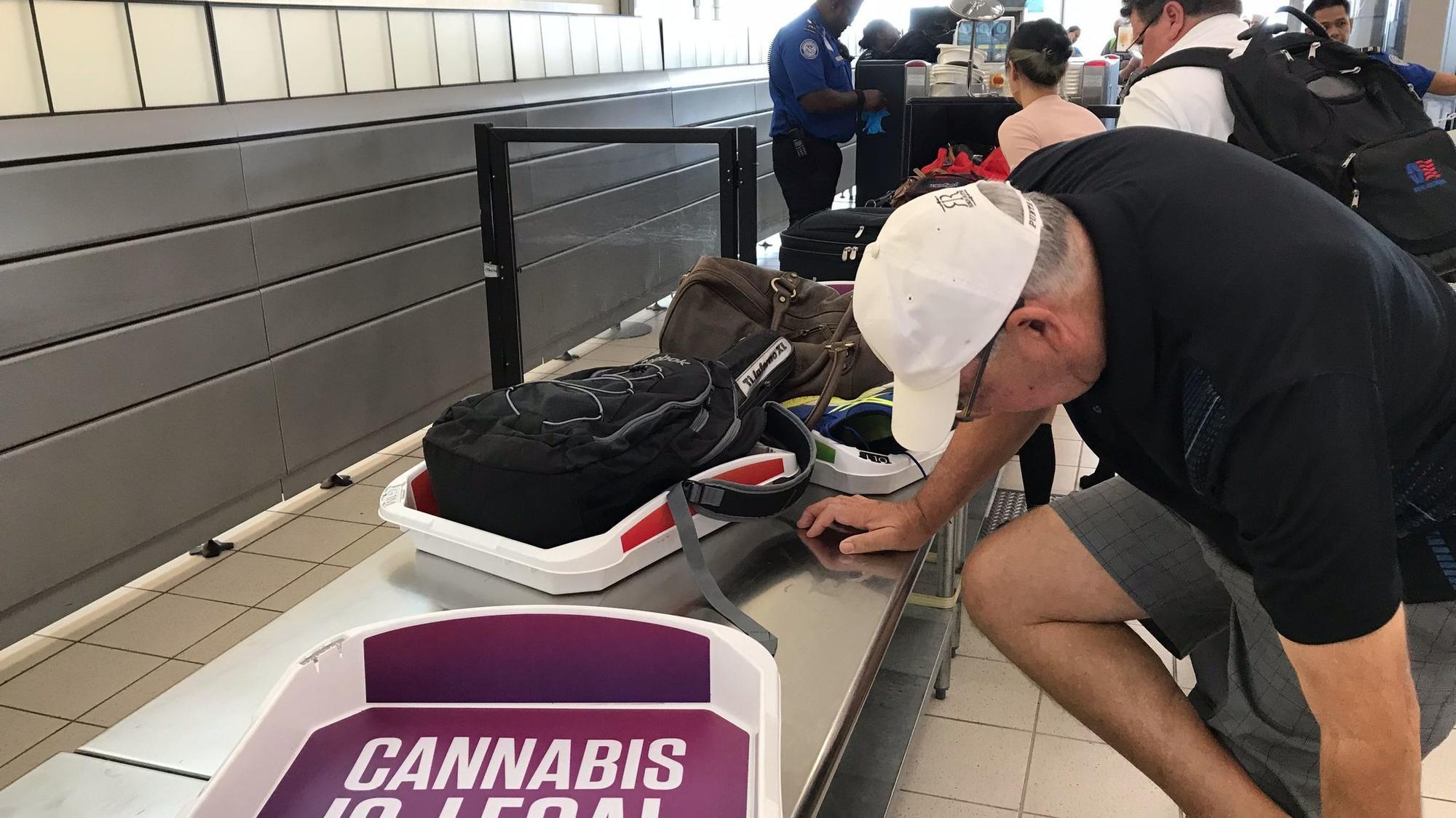Every now and then, the culture experiences a watershed, a moment when we look up and say, wow, things really have changed.
I know you think I am talking about sexual harassment, but I’m not. It’s far too early to say whether the torrent of revelations about sexually predatory men will shame them (and future generations) into changing how they behave.
I am talking about cannabis.
On New Year’s Day 2018, California enters a new era for legalization, which may hasten the end of decades of prohibition that have propelled a black market, ruined countless lives and obstructed research into what may be one of humanity’s most helpful therapeutic substances.
How do I know this moment of transformation is upon us?
Because Friday morning, I went through a Transportation Security Administration checkpoint at Ontario International Airport and saw it with my own eyes. A sticker that covered the bottom of the tray for my belongings said in huge block letters: “CANNABIS IS LEGAL.”
There was some fine print near the bottom: “Traveling with it is not. Leave it in California.”
And beneath that admonition, there were five corporate logos, all belonging to Organa Brands, the 7-year-old cannabis company that came up with this unusual campaign.
“I’m still pinching myself,” said Organa Brands co-founder Jeremy Heidl.
Easy to see why. The TSA is a federal agency and the government remains hostile to marijuana. The Drug Enforcement Administration considers it as dangerous as cocaine, with no acceptable medical usage. (Never mind that this is contradicted by — well — reality.)
However, while the TSA draws the line at political ads, it does not regulate advertising messages that appear in the trays that go through its X-ray machines.
Local airport authorities contract with the company that provides the bins, said TSA spokeswoman Lorie Dankers. TSA, she noted, is “not part of that financial deal.”
The “Cannabis Is Legal” campaign was the brainchild of Organa’s public relations manager Jackson Tilley, who approached Heidl after seeing vape pens advertised at Denver International Airport. “This is absolutely something we have to do,” Tilley recalled thinking.
Organa Brands is one of the largest cannabis companies in the industry. Launched in 2010, it first produced cannabis extracts before branching into vape pens with disposable cartridges. Later, the company started an edibles division. It now does business in 11 states, has 12 production facilities and sells hardware in 19 countries. Heidl, who recently moved the company to Puerto Rico, put its annual sales at “north of $100 million.”
When Tilley approached Heidl about advertising in airports, Heidl said he tried to be supportive: “I said, ‘Sure, Jackson.’ But I was thinking, ‘Never going to happen.’”
Tilley soon contacted Security Point Media, a Florida-based company created in the aftermath of Sept. 11, which has a patent on the plastic trays and the carts that move them around at airport security checkpoints.
“If you see that anywhere in the U.S., that is part of our intellectual property,” said Joe Ambrefe, president and chief executive of Security Point Media.
(I know what you’re thinking: How the heck did someone patent a system of trays and carts? That’s what the TSA thought, too, but a U.S. Court of Federal Claims judge ruled against the TSA last year when it tried to challenge the patent as “obvious” and therefore invalid. According to the website Law360,the judge said the TSA’s own internal documents showed that the trays and carts led to an 80% increase in checkpoint efficiency. A patent, ruled the judge, must be protected from something that is obvious only in hindsight.)
The purpose of creating the trays and carts, however, was not only to increase airport efficiency but to create a new medium for advertising. Security Point Media has dozens of clients, as varied as Marriott and Organa. But I digress.
But shortly before the trays were to land, officials got cold feet and pulled out. That may have been for the best. The message that Sacramento airport officials had approved was “Cannabis is illegal to carry across state lines.”
“That doesn’t send the right message,” said Organa Brand’s Heidl. “And we could look bad saying ‘cannabis is illegal.’ We are working hard to normalize it and do good. We felt like this was a responsible campaign.”
On Thursday, I bought a one-way plane ticket from Ontario to Oakland just to get a close-up view. When I passed through the security checkpoint Friday morning, I have to admit, I started chuckling when I came upon the trays.
Three TSA agents who ushered me through the line were less than enthusiastic. They said they were perplexed, even taken aback.
Passengers, however, were either mildly amused or blasé.
The only travelers I found who had a nuanced view of the ads were Karen and Russ Silhanek, a married couple from Rancho Cucamonga who were on their way to Las Vegas.
Russ Silhanek, 59, who is retired due to a disability, uses cannabis medically for pain and was a bit put off by the fine-print warning not to take pot across state lines. His checked luggage contained cannabis.
“This is like telling people, ‘You can’t take your medicine with you,’” Silhanek said.
My understanding is that if you decide to discard your cannabis while in the TSA line, you can toss it in the same receptacle where your verboten Evian bottles go.
However, said Dankers, “If TSA officers come across marijuana during their regular screening duties, in checked or carry-on bags, they will notify local law enforcement, who determine what happens next.”
My guess is that if a passenger is carrying cannabis for personal use, local law enforcement will respond with a big fat yawn.
Because, as you know, in California, cannabis is legal. I’ve seen the airport bins to prove it.
credit:420intel.com

